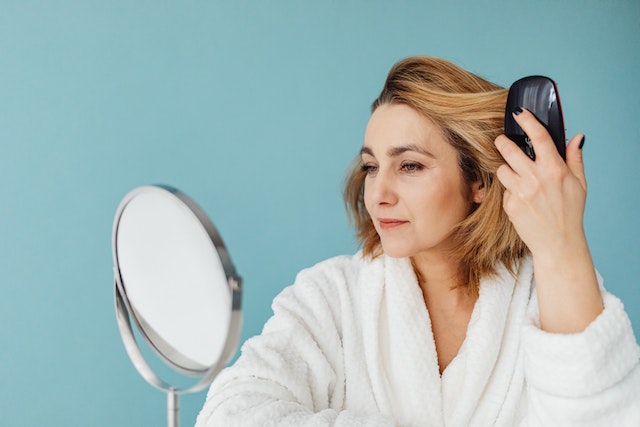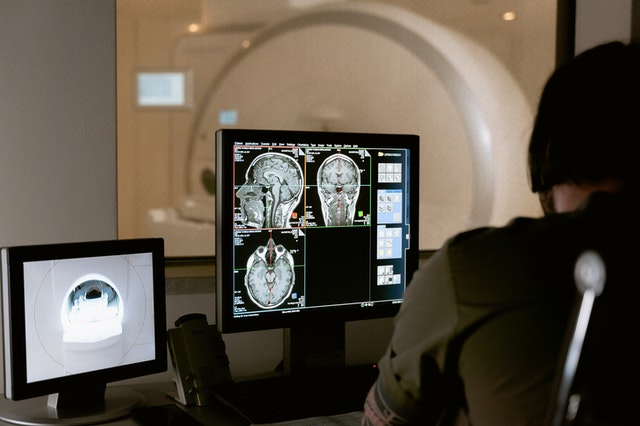Can Hormones Cause Thin Hair?
Hormone imbalance, for example, a heightened level of the male hormone androgen, is the most common cause of hair thinning in both men and women. When hormones are out of balance, the body can produce more androgens, affecting hair growth. As androgens bind to the hair follicles, they can cause them to shrink and eventually stop producing hair. This type of hair thinning is most commonly seen in men, as they naturally have higher levels of androgens. Women can also be affected by hormone-related hair thinning, particularly during hormonal fluctuation, such as during menopause or pregnancy.
Let's look at some causes of unwanted hair loss.
What hormone issues can cause hair thinning in women?
Hair thinning in females can be caused by various hormone issues, including
thyroid problems - menopause,
- medication,
- and hormonal imbalances.
How do Thyroid Problems cause hair loss?
Thyroid problems, such as underactive or overactive thyroid, can cause hair thinning. Thyroid problems can cause thinning hair because the hormone imbalances associated with thyroid problems can disrupt the normal hair growth cycle.
When the body does not produce enough thyroid hormone, the hair follicles can enter a dormant stage, leading to hair thinning and shedding.
Additionally, certain medications used to treat thyroid problems can have side effects that cause thinning hair.
How does menopause cause hair thinning?
How does medication cause hair thinning?
Medications such as birth control pills, chemotherapy, and anticoagulants can also cause hair thinning in women.
How does Hormone cause hair thinning?
In addition, hormone imbalances, such as too much estrogen or too little testosterone, can cause unwanted hair thinning.
What are other types of hormone issues that cause hair thinning?
- Hypothyroidism: Low levels of the hormone thyroxine (T4) can lead to hair thinning in women.
- Hyperthyroidism: Excessive levels of thyroxine can also lead to hair thinning.
- Polycystic Ovary Syndrome (PCOS): Women with PCOS have an imbalance of sex hormones, including testosterone, which can lead to thin hair.
- Anemia: Low iron levels can cause anemia, leading to hair thinning.
- Menopause: During menopause, women experience a drop in the hormone estrogen. This can cause the hair follicles to become smaller, leading to thinner hair.
- Pregnancy: Pregnancy can cause hormonal fluctuations, leading to hair thinning.
- Stress: Stress can cause the body to produce higher levels of the hormone cortisol, which can lead to hair thinning.
Can hormonal hair loss be reversed?
Many people want to know if hormonal hair loss can be reversed. The answer is yes! Fortunately, unlike genetic hair loss, most hair loss caused by hormonal imbalances is reversible. - Flo
How to stop hormonal hair loss?
- Visit a Trichologist: A Trichologist specializes in hair and scalp health. They can assess your hair loss and provide a personalized treatment plan.
- Check Thyroid Function: Hair loss can be caused by an underactive thyroid. Have your doctor measure your TSH levels to ensure your thyroid functions properly.
- Take Supplements: Certain supplements, such as biotin and zinc, can help reduce hair loss from hormones. Speak to your doctor about which supplements may be best for you.
- Avoid Harsh Hair Products: Harsh chemicals in hair styling products can damage your hair and lead to hair loss. Use natural, sulfate-free products instead.
- Eat a Healthy Diet: To help protect the hair from thinning, eat a diet rich in lean protein, healthy fats, and complex carbohydrates can help reduce hair loss. Be sure to include plenty of fruits and vegetables as well.
- Reduce Stress: Stress can cause hair loss. Relax and practice stress reduction techniques such as yoga and meditation.
- Take Approved Medication: Speak to your doctor about which medication may be best for you.











0 Comments
Check out a variety of hairstyles, haircare, beauty tips, fashion, Motivation, and more on this beauty blog. Follow us on our social media sites.